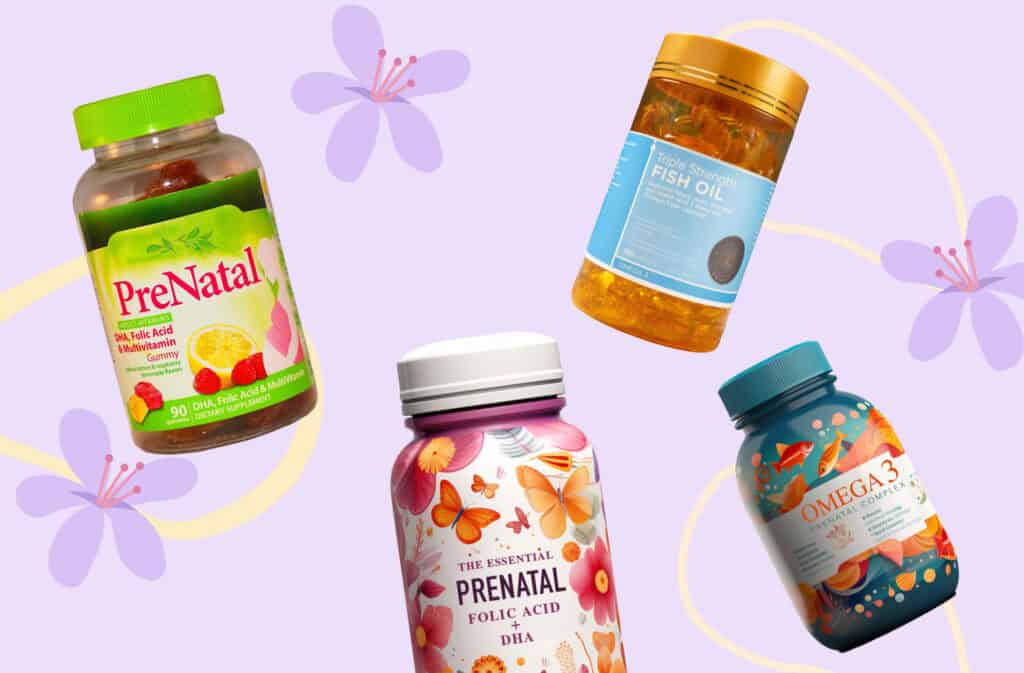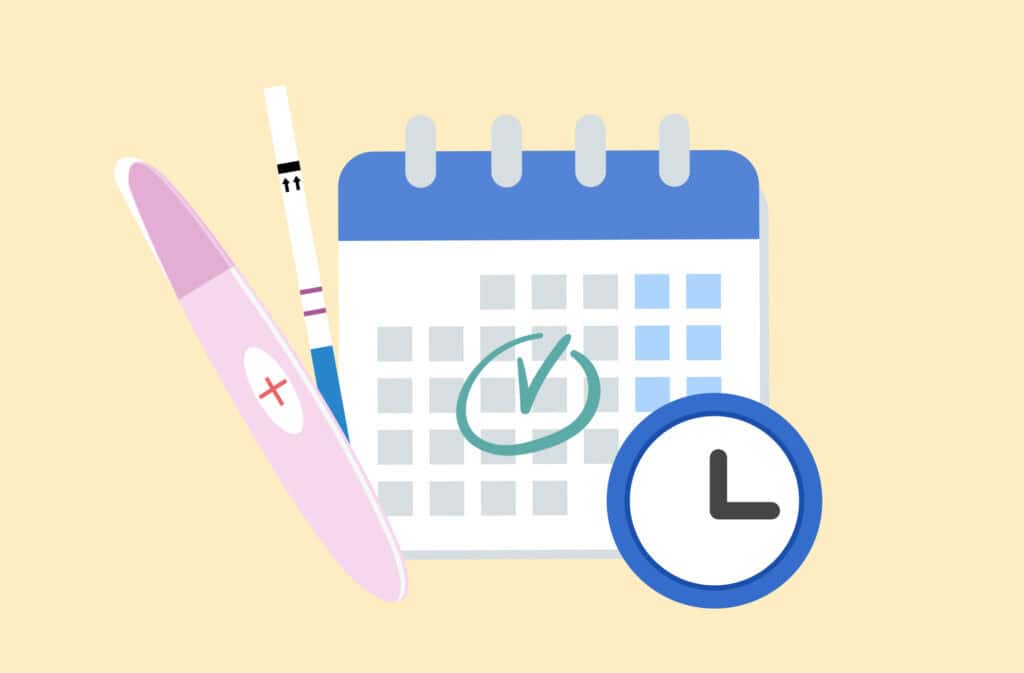Femia > Health Library > Getting Pregnant > Planning pregnancy > The best prenatal vitamins for pregnancy: Recommendations from the OBGYN
The best prenatal vitamins for pregnancy: Recommendations from the OBGYN

- Updated Feb 10, 2025
- Published
CRAFTED BY HUMAN
Crafted by human At Femia, we provide accurate and up-to-date information at every stage of your journey, from trying to conceive, pregnancy and postnatal support. All content is created by a real person based on in-depth research and own professional experience. Femia ensures that you will receive expert advice, strict accuracy and a personalized approach from our authors/medical experts. Learn more about our editorial policy.
FACT CHECKED
Fact checked At Femia Health, we maintain the highest standards of editorial excellence in delivering content focused on helping you conceive, guiding you through pregnancy, and supporting you postpartum. Explore our content review principles to learn how we ensure the accuracy and quality of our health and lifestyle tips for every stage of your journey.
Prenatal vitamins are essential for promoting healthy fetal development and supporting the mother’s well-being. Look for a supplement that is specifically designed for pregnancy and contains adequate amounts of key nutrients like folic acid, vitamin D, iron, and DHA. Ideally, you should start taking a prenatal supplement up to three months before you start trying to conceive.
Your healthcare provider will be able to help you choose the right supplement, but your choice will likely depend on your personal nutritional needs, general health, any medications you take, and any risk factors you have.
Prenatal vitamins are supplements specifically tailored to the nutritional needs of pregnant women. Normally, eating a nutritious and well-balanced diet is enough to ensure that you have all of the vitamins and minerals your body needs. But, during pregnancy, your body needs extra amounts of certain nutrients, and it can be difficult to get enough of them through diet alone.
Certain nutrients are essential for fetal development and the mother’s health, and not having enough of them can increase the risk of fetal defects and pregnancy complications. If you’re pregnant or trying to conceive and wonder what prenatal supplements you need, this article will take you through which prenatal supplement is best and why you should take them.
Track your fertility and get personalized prenatal supplement advice
What are prenatal vitamins and why are they important?
Prenatal vitamins are supplements designed specifically to help women meet the unique nutritional needs of pregnancy. During pregnancy, your body needs a higher amount of certain nutrients to stay healthy and support fetal growth. Many pregnant women struggle to meet this increased daily requirement, so taking prenatal supplements ensures that your growing baby has all of the vitamins and minerals it needs for healthy development. Here are some of the benefits of taking a prenatal vitamin:
- Supporting healthy fetal growth and development. Some nutrients are essential for the healthy development of the fetus. Not having enough folate (folic acid or vitamin B9) during pregnancy can increase the risk of your baby developing a neural tube defect (NTD). NTDs are severe birth defects of the brain or spinal cord that develop in the first few weeks of pregnancy.
- Preventing pregnancy complications. According to the World Health Organisation (WHO) low levels of certain minerals, like iron and vitamin D, can increase the risk of certain pregnancy complications like anemia, pre-eclampsia, and preterm birth.
- Filling nutritional gaps. It’s always better to have a healthy and nutritious pregnancy diet that contains all of the vitamins and minerals your body needs. However, pregnancy nausea, vomiting, and food aversions can prevent you from getting all of these nutrients. While tailoring your pregnancy diet to fight nausea can help, a prenatal supplement fills any gaps you have and ensures your unborn baby gets all of the nutrients it needs.
👉Find out more: Odds of getting pregnant by age chart: Fertility and pregnancy chances explained
Key nutrients to look for in prenatal vitamins
Before you decide which prenatal supplement is right for you it’s important to understand the key nutrients required for a healthy pregnancy and what foods they’re found in. This will enable you to tailor your diet and make sure you’re getting the right vitamins and minerals.
Here’s a list of key vitamins and minerals needed during pregnancy and how they support you and your baby.
| Nutrient (daily recommended allowance in pregnancy according to ACOG) | Importance during pregnancy | Best natural source |
|---|---|---|
| Folic acid (600 micrograms) | Helps prevent neural tube defects like spina bifida. Supports general health and growth of the placenta and fetus | Leafy greens (spinach, broccoli), beans, pulses, nuts, fortified cereals, orange juice |
| Iron (27 milligrams) | Helps make red blood cells, which are needed to deliver oxygen to the fetus | Red meat, fish, poultry, iron-fortified cereals |
| Calcium (1000 milligrams) | Builds strong bones and teeth in the fetus and preserves mother’s bone density | Milk, cheese, yogurt, sardines, dark green leafy vegetables (kale, broccoli), some seeds |
| Vitamin D (600 international units) | Helps build the fetus’ bones and teeth, promotes healthy eyesight and skin | Sunlight, fortified milk, fatty fish (tuna, sardines), egg yolk |
| DHA (omega—3 fatty acids) (200 mg) | Aids development of fetus’ nervous system | Fatty fish (limit intake of fatty fish to two portions per week during pregnancy), flaxseed oil, walnuts, kidney beans |
| Iodine (220 micrograms) | Essential for healthy brain development of fetus | Lodized table salt, dairy products, meat, eggs |
| Choline (450 milligrams) | Essential for fetal brain and spinal cord development, supports the placenta, and may support mother’s health during pregnancy | Milk, eggs, peanuts |
| Vitamin C (85 milligrams) | Aids growth and repair of collagen, helps maintain strong bones and teeth | Citrus fruits, tomatoes, strawberries, broccoli |
| Vitamin B12 (2.6 micrograms) | Maintains the nervous system and helps red blood cells form | Meat, fish, poultry, milk |
| Vitamin B6 (1.9 milligrams) | Helps red blood cells form | Beef, pork, ham, bananas |
Good to know: Vitamin A (retinol) supports healthy skin and eyesight in both the fetus and mother, plus contributing to fetal bone growth. However, excessive amounts of vitamin A can be harmful to your baby’s development. The ACOG recommends a daily intake of 770 micrograms, which is typically achievable through a balanced diet. Foods like carrots, leafy green vegetables, and sweet potatoes are all good sources.
The WHO advises vitamin A supplementation only for pregnant women in areas where vitamin A deficiency is a significant public health concern.
What prenatal vitamins should I take?
When deciding on what prenatal vitamins to take, it’s essential to consult your healthcare provider first. They can help you to choose the best supplement for your individual needs and ensure you’re getting the right nutrients for a healthy pregnancy.
Your choice of prenatal vitamins can be influenced by several factors, including:
- Dietary restrictions. If you follow a vegetarian, vegan, or other specialized diet, then you may need a supplement that contains certain nutrients, like vitamin B12, iron, choline, and DHA. It can be hard to reach the recommended daily allowance of some nutrients through diet alone, especially if you don’t eat meat, fish, or dairy.
- Allergies and intolerances. If you’re allergic or intolerant to certain ingredients, like gluten, soy, or fish, then you will need to look for an allergen-free prenatal vitamin.
- Health conditions and regular medications. If you have a health condition—like anemia, a thyroid disorder, or take certain medications, like anti-epileptics—then your nutritional requirement of certain nutrients might be higher. Your healthcare provider will be able to help you find the best supplement for your needs.
- Individual pregnancy risk factors. If you have a family history or previous pregnancy history of neural tube defects, then your healthcare provider might prescribe you a supplement with a higher dose of folic acid.
Best prenatal vitamins for pregnancy: How to choose
There are many different types of prenatal supplements available, and you might feel like you don’t know where to start. Here’s a guide to help you navigate your options.
- Over-the-counter (OTC) vs. prescription options. Most women will be able to buy their prenatal vitamins OTC (without prescription), but some may need a specific supplement that their healthcare provider will prescribe. If you’re purchasing OTC, then make sure you check the exact nutrients and dosage of the supplement. Don’t be afraid to reach out to your healthcare provider if you’re unsure about your choice.
- Gummy vitamins vs. capsules. While gummy vitamins can be easier to swallow and taste nicer, they may also contain added sugar and be lacking essential nutrients, like iron. Capsules tend to contain a more comprehensive nutrient profile but can leave some women feeling nauseous or constipated.
- Vegan or allergy-free options. If you’re vegan, then look for supplements that are vegan-friendly and contain plant-based DHA and vitamin b12. The same goes for if you have an allergy—many brands now cater to gluten, soy, and dairy allergies.
Top tips for choosing the best prenatal vitamin for you
Here are three things to consider when deciding on the right prenatal vitamin for you:
- Always read the label. Make sure that your supplement is specifically designed for pregnancy and has an adequate amount of folic acid, iron, calcium, and vitamin D in it as well as any other key nutrients you might need.
- Consider your personal needs. Your personal diet and health will dictate whether you need a supplement that contains a wide range of nutrients or just a few key ones. Whatever supplement you take, according to the National Health Service (NHS), it should always contain at least folic acid and vitamin D.
- Consult your healthcare provider. Discuss the options with your pregnancy healthcare provider first to make sure you choose a supplement right for you.
👉Find out more: How long does it take to get pregnant after sex: Understanding the timeline
When to start taking prenatal vitamins
Ideally, you should start taking prenatal vitamins up to three months before you start trying to conceive. This ensures that your body has enough of the essential nutrients, particularly folic acid, to support fetal development in the earliest stages of pregnancy. Neural tube defects develop in the first four weeks of pregnancy.
Sometimes, it’s not possible to take prenatal vitamins before you conceive, especially if you weren’t planning for a pregnancy. In this case, try not to worry, but start taking a prenatal supplement as soon as you know you’re pregnant.
Your healthcare advisor will be able to give you personalized advice, but it can be beneficial to continue your prenatal supplements throughout the entire pregnancy and while you breastfeed, if that’s what you choose to do.
Best time to take prenatal vitamins
Before starting your prenatal vitamin, make sure you’ve read the instruction manual fully. Instructions can differ between brands depending on the nutrients they contain. For example, they might suggest that you:
- Take your prenatal vitamin with food to reduce nausea. Or, if that doesn’t help, try taking half in the morning and half in the evening.
- Take any supplement containing iron with water or juice rather than milk. Calcium-rich foods can affect how your body absorbs iron.
- Don’t stop taking your prenatal supplement if it makes you feel nauseous without discussing different options with your healthcare provider first.
Side effects of prenatal vitamins
Many women will be able to take a prenatal vitamin without experiencing any unpleasant side effects; however, some might notice one or more of the following:
- Constipation: Increase your fiber intake, make sure you’re drinking 8–12 cups of water a day, or ask your healthcare provider about a stool softener.
- Nausea: Take your supplement with a meal, split the dose, or consider changing the brand of supplement after discussion with your healthcare provider.
- Bloating: both pregnancy and supplements can make you feel bloated; this should settle over time.
- Stomach cramps: Constipation can cause stomach cramps, but it’s important to discuss any abdominal pain with your healthcare provider.
You should always discuss any unusual symptoms with your healthcare provider, as there may be another reason behind your symptoms that needs medical attention.
Benefits of prenatal vitamins while not pregnant
It’s a good idea to take a prenatal vitamin if you are thinking about getting pregnant in the near future. Taking prenatal vitamins before pregnancy ensures that your body has adequate amounts of the key nutrients it needs to support pregnancy.
However, if you have no plans to get pregnant and are just looking for a multivitamin to support your overall health, then there are lots of options out there, some of which might be more appropriate for your needs. Always discuss any long-term medication or supplements that you plan to take with your healthcare provider first. Not all supplements, even those that can be bought OTC, are suitable and safe for everyone. This is especially true if you have an underlying health condition or are on other long-term medications.
Do prenatals help you get pregnant?
No, prenatal supplements do not directly boost your fertility, but some supplements can support your reproductive health and overall well-being. However, making sure your body has an adequate amount of key nutrients to support a pregnancy can help reduce the chances of serious pregnancy complications if you do get pregnant.
Having a deficiency in certain nutrients may affect your chances of having a successful pregnancy. A 2018 meta-analysis found that having a vitamin D deficiency while undergoing IVF significantly reduced the chances of having a baby. It is recommended that any woman with a vitamin D deficiency takes vitamin D supplements.
Track your fertility and get personalized prenatal supplement advice
Questions from the Femia community
Can I take prenatal vitamins if I’m not trying to get pregnant?
Yes—they can support general health, but consult your healthcare provider first to make sure they’re the right fit for you and you’re not over-supplementing.
Do I need to take prenatal vitamins if I’m having a planned C-section?
Yes, prenatal vitamins support your unborn baby’s health and development as well as your overall health and recovery, regardless of the type of birth.
What happens if I forget to take my prenatal vitamin for a day?
Missing one day is not harmful, but try to take them consistently to ensure you’re meeting an adequate nutrient intake. Consider setting an alarm on your phone to remind you or taking them with the same meal (e.g. breakfast) each day.
Can I switch brands during pregnancy?
Yes, you might find that a certain brand doesn’t agree with you, and switching brands can help relieve any side effects you’re experiencing. However, ensure the new brand still has the necessary nutrients you need, and consult your healthcare provider first.
What should I do if prenatals make me nauseous?
Try taking them with food or at bedtime, switching to a gummy or chewable option, or splitting the dose. If they continue to make you feel nauseous, consult your healthcare provider to discuss other options, but don’t just stop taking them.
The bottom line
During pregnancy, your body requires higher levels of certain vitamins and minerals to support your health and your baby’s growth and development. Prenatal supplements are essential for meeting these increased nutrient needs and bridging any nutritional gaps.
When choosing a prenatal supplement, make sure that it contains an adequate amount of folic acid, vitamin D, iron, and any other nutrients that you may need. Discuss your choice with your healthcare provider; they will be able to take a personalized approach, taking into account any health conditions, allergies, or dietary restrictions you have, and advise you on the best prenatal supplement for you.
Ideally, you should start taking prenatal supplements one to three months before you start trying to conceive. This will ensure that you have enough of the essential nutrients to support a healthy pregnancy, especially in the first few weeks, where fetal brain and spinal cord development is critical.
References
- Benefits of taking folic acid. www.tommys.org/pregnancy-information/planning-a-pregnancy/are-you-ready-to-conceive/benefits-taking-folic-acid-pregnancy.
- “How Much Water Should I Drink During Pregnancy?” ACOG, www.acog.org/womens-health/experts-and-stories/ask-acog/how-much-water-should-i-drink-during-pregnancy#:~:text=During%20pregnancy%20you%20should%20drink,helps%20waste%20leave%20the%20body.
- Vitamin D supplementation during pregnancy. www.who.int/tools/elena/interventions/vitamind-supp-pregnancy.
- Vitamin A supplementation during pregnancy. www.who.int/tools/elena/interventions/vitamina-pregnancy.
- “Neural Tube Defects.” Birth Defects, 16 May 2024, www.cdc.gov/birth-defects/about/neural-tube-defects.html.
- “Nutrition During Pregnancy.” ACOG, www.acog.org/womens-health/faqs/nutrition-during-pregnancy.
- “Prenatal Vitamins: Why They Matter, How to Choose.” Mayo Clinic, www.mayoclinic.org/healthy-lifestyle/pregnancy-week-by-week/in-depth/prenatal-vitamins/art-20046945.
- “Spina Bifida – Symptoms and Causes.” Mayo Clinic, www.mayoclinic.org/diseases-conditions/spina-bifida/symptoms-causes/syc-20377860.
- Zhao, Jing, et al. “Whether Vitamin D Was Associated With Clinical Outcome After IVF/ICSI: A Systematic Review and Meta-analysis.” Reproductive Biology and Endocrinology, vol. 16, no. 1, Feb. 2018, https://doi.org/10.1186/s12958-018-0324-3.

Having an orgasm while pregnant is overall safe – nonetheless, several myths and misinformation persist in the community. Let’s discuss if denying yourself intimacy is truly the right thing to do.

Discover the complete week-by-week guide about the size and stages of the pregnant belly, how it grows, and what to expect during each trimester.

Can you get pregnant without ovulation? Learn how ovulation affects pregnancy chances, the importance of the fertile window, and what happens if you’re not ovulating.

